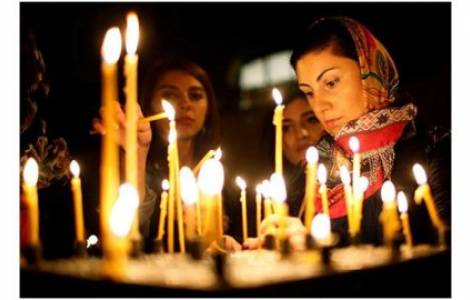
Beirut (Agenzia Fides) - The Eastern Churches begin the penitential season of Lent while earthquakes, poverty, conflicts and political crises continue to sow pain and anguish in the region. The Patriarchs of the Eastern Catholic Churches have opened the time of the "great fast" with long and intense pastoral letters in which they have resorted to the writings of the Fathers and the great Eastern theologians to propose how to live the forty days prior to the passion, death and resurrection of Christ the Redeemer. In this way, thanks to their grateful memory of the spiritual patrimony of their Churches, the authors of the Letters did not offer empty neo-conformist slogans and puns, but useful contributions to live the Lenten season as a propitious time to wait for the Easter encounter with Jesus, finding comfort even in the midst of the new tribulations that torment the peoples of the Middle East.
All the Heads of the Churches of the East have reiterated in their letters that fasting, prayer, penance and works of charity are the practices that have always characterized the Lenten season lived in faith in Christ. Iraqi Cardinal Louis Raphael Sako, Patriarch of the Chaldean Church, recalled that for Saint John Chrysostom (347-407), prayer "makes possible what is impossible and easy what is difficult. It is impossible for a person who prays to commit a sin". "Prayer - added the Patriarch - is not a theological research, but focuses on who we are waiting for", and "it is a pity that the practice of penance is currently in crisis, due to ignorance and unconsciousness of the Sin. Repentance and confession of our sins", added the Iraqi Cardinal "help us overcome our weaknesses and purify ourselves". Isaac of Nineveh (7th century), quoted by Patriarch Sako, recalls that with penance "the grace that we lost after baptism, with a lazy life, is renewed in us by repentance through discernment of the mind. And whoever deprives himself of repentance deprives himself of imminent bliss". The Chaldean Patriarch has also asked the baptized to collect the offerings resulting from fasting in a fund to be allocated to the earthquake victims in Syria and Turkey.
In his Pastoral Letter for Lent, the Syrian Catholic Patriarch Ignace Youssif III Younan has once again proposed fasting, prayer, penance and almsgiving as practices of conformation with Jesus himself, who teaches in the Gospel that "God does not want our sacrifices, but mercy". With these words - remarked Patriarch Younan - "Jesus clearly revealed to us that he did not come to call the righteous, but sinners, and that the healthy do not need a doctor, but the sick". For this reason, "fasting and almsgiving, which the Church proposes together with prayer, especially during the time of Great Lent, are a propitious occasion to identify ourselves with the gaze of Christ." The Patriarch also quoted a great theologian saint from the East, Saint Ephrem the Syrian, who recalled that "He who fasts on bread and guards against evil is like a swift eagle that the evil one cannot drive away. And whoever fasts with purity, exalts his thoughts to the Most High and despises the lusts of the world, because his thoughts are with God". In this way - added the Primate of the Syrian Catholic Church, citing Benedict XVI's message for Lent of 2006 - "while the tempter leads us to despair or to place a vain hope in the work of our hands, there God keeps us and sustains us". And today, in the face of the suffering caused by the earthquake, only He can dispel "the darkness of fear".
To recall the Christian urgency of coming to the aid of brothers and sisters overwhelmed by the earthquake, the Maronite Cardinal and Patriarch Béchara Boutros Raï also quoted the Fathers of the Eastern Churches in his Letter for Lent: "You do not have the right to use your money as a person who enjoys it according to your desire, but rather as a person to whom it has been entrusted", wrote Saint Basil the Great, while for Saint Gregory of Nisa, "what flows from you is not yours , therefore you cannot own it". The rule of fasting - the Maronite Patriarch commented - is that "what you save by fasting is to help those in need". (GV) (Agenzia Fides, 21/2/2023)